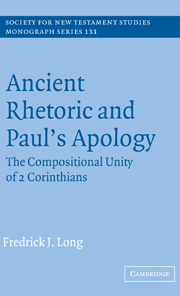Book contents
- Frontmatter
- Contents
- List of figures
- List of tables
- Preface
- List of abbreviations
- 1 An apology for the unity of 2 Corinthians
- Part 1 A survey of ancient forensic discourse
- Part 2 A rhetorical analysis of 2 Corinthians as ancient apology
- 7 The rhetorical exigency of 2 Corinthians
- 8 The rhetorical disposition of 2 Corinthians
- 9 The rhetorical invention of 2 Corinthians
- 10 The rhetoric of 2 Corinthians and the nature of Paul's theology
- Appendix I How the peroratio (12.11–13.10) summarizes 2 Corinthians
- Appendix II Topoi for each subtype of the qualitative stasis
- List of references
- Index of biblical references
- Index of ancient authors and sources
- Subject index
9 - The rhetorical invention of 2 Corinthians
Published online by Cambridge University Press: 12 November 2009
- Frontmatter
- Contents
- List of figures
- List of tables
- Preface
- List of abbreviations
- 1 An apology for the unity of 2 Corinthians
- Part 1 A survey of ancient forensic discourse
- Part 2 A rhetorical analysis of 2 Corinthians as ancient apology
- 7 The rhetorical exigency of 2 Corinthians
- 8 The rhetorical disposition of 2 Corinthians
- 9 The rhetorical invention of 2 Corinthians
- 10 The rhetoric of 2 Corinthians and the nature of Paul's theology
- Appendix I How the peroratio (12.11–13.10) summarizes 2 Corinthians
- Appendix II Topoi for each subtype of the qualitative stasis
- List of references
- Index of biblical references
- Index of ancient authors and sources
- Subject index
Summary
Introduction
Turning to rhetorical invention in 2 Corinthians, I am painfully aware that I am working with an ancient text. This text is dynamic, contoured, and cryptic. It is, however, the only window we have through which to reconstruct Paul's invention of arguments. Did Paul prepare his apology according to the rhetorical invention process within ancient rhetorical theory and as modeled in forensic practice? My research would indicate that he keenly constructed a line of defense. Second Corinthians contains numerous interrelated argumentative strategies and techniques consistent with forensic rhetorical theory and practice.
Essential issue and stasis theory
Can 2 Corinthians be analyzed successfully according to stasis theory? If so, would this necessarily indicate that Paul utilized stasis theory? The first step to answering these questions is to discover what stasis would apply according to the reconstructed situation from Chapter 7. In the second step, I shall apply forensic theory to probe the argumentative landscape of 2 Corinthians.
Qualitative stasis in 2 Corinthians
I begin with a preliminary consideration of the nature of the charges and the determination of the overall stasis of the case. According to forensic theory we should expect that Paul constructed the main argument in 2.1–9.15 with one primary stasis (see Quint. Inst. 3.6.9). The evidence suggests that, since he could not deny the charges against him, Paul developed his defense according to the qualitative issue, which was a defendant's most honorable choice (Quint. Inst. 3.6.83).
- Type
- Chapter
- Information
- Ancient Rhetoric and Paul's ApologyThe Compositional Unity of 2 Corinthians, pp. 199 - 229Publisher: Cambridge University PressPrint publication year: 2004



